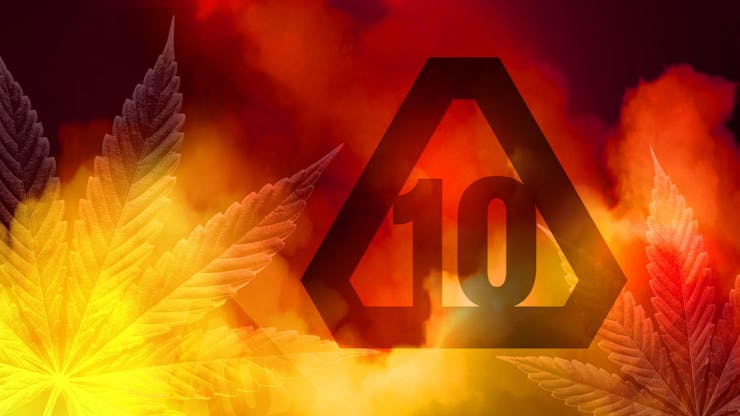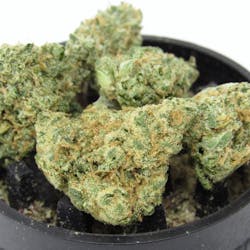Delta-9 THC is the cannabinoid we all know and love—it’s the main compound in weed strains that gets people high and has been doing so for thousands of years. You may have heard of delta-8, which has gained in popularity in the past year or so, a cannabinoid similar to delta-9, but less potent.
Now, to confuse things even more, a cannabinoid called delta-10 is becoming more popular. Truly, it’s hard to keep up with weed trends.
So let’s see what the big deal is with delta-10, if it can get you high, how it compares to other cannabinoids, and how to get it.
What is delta-10?
Delta-10 is a cannabinoid found in trace amounts in the cannabis plant. Like regular THC—delta-9—it can get you high, but it is less potent than delta-9. This makes it similar to delta-8, another cannabinoid that is less potent than regular THC.
According to Roger Brown, president and CEO of ACS Laboratory, a lab that tests hemp-derived products from 48 states, “Delta-8 was very popular and had really taken off, and now delta-10 has taken off as well, and we’re seeing it in a significant amount of products that are being tested.”
Delta-10 is commonly processed from hemp-derived CBD, as is delta-8. Because hemp is legal all over the US (more on that below), delta-10 is considered legal in all 50 states. However, as with delta-8, certain states have outlawed delta-10 on their own.
The cannabinoid is usually available in vape carts, gummies, or other edibles, and can be mailed to certain states.

Sour Diesel THCA Flower
28.1% THCA | Chemdawg x Super Skunk
Arete’s Sour Diesel hemp THCA flower is a 90/10 sativa-dominant hybrid grown indoors with living soil. Expect dense green buds with a heavy frost and a classic, loud-diesel aroma. Effects are energetic, creative, and cerebral. Have it shipped to your door in US states that allow hemp flower products!
3.5g, 7g, 14g, and 28g
We may earn a small commission if you buy through links on this page. Availability subject to law.
What’s the difference between delta-8 and delta-10?
To create both versions of THC, CBD oil is first extracted from legally grown hemp. The resulting oil is processed into either delta-10 THC or delta-8 THC. Different chemicals and reactions are used to create the different deltas.
Delta-10 THC is not easy to manufacture. It must be refined extensively, so you usually don’t see it in abundance. “If you see a product out there that says 99% delta-10, I don’t believe it,” said Brown. Because it is so hard to produce, a lot of products combine delta-10 with delta-8.
Is delta-10 safe to consume?
Delta-10 is safe to consume, however, Brown stressed that as chemicals are used in the extraction process, it is critical to only consume delta products that have been lab-tested at an accredited lab to ensure they have been purged of all chemicals and contaminants and are safe for consumption.
Legitimate delta-10 products, like those tested at ACS Laboratory and other licensed labs, will have a QR code showing consumers the proof of testing certification.
What are the effects of delta-10?
Delta-10 can get you high, although it is much less potent than regular delta-9 THC. Anecdotally, delta-10 is commonly reported to provide energizing effects, whereas delta-8 is reported to be more sedating. Delta-10 is often compared to strains like Sour Diesel, Pineapple Express, or Super Lemon Haze, whereas delta-8 is compared to strains like OG Kush, Wedding Cake, and Purple Punch.
“To put it in perspective,” said Brown, “delta-8 is more like an indica and delta-10 is more like a sativa. They have two very different vibes to them. People who want to use a sleep aid, as an example, have used delta-8, [whereas] delta-10 gives you more creativity or perspective.”
It’s important to note that these effects are not based on any scientific study; more research is needed on these compounds. On top of that, every person has a unique body chemistry and compounds will affect people differently.
Is delta-10 legal?
Currently, delta-10 products are federally legal because they are derived from hemp, which was legalized in the US when Congress passed the 2018 farm bill. This is what makes delta-10 so appealing—consumers who live in states where cannabis is illegal can purchase delta-10 because it is technically derived from hemp and not cannabis. (Hemp is legally defined as a cannabis plant containing less than 0.3% delta-9 THC.) Although delta-10 is less potent than regular delta-9 THC, people can still get high from it, legally.
However, as is the case with delta-8, some states have taken it upon themselves to outlaw delta-10. Additionally, some delta-10 producers won’t ship to certain states if that state’s laws are unclear.
This leaves the legal landscape for cannabinoids messy. THC (delta-9) is recreationally legal in some states and medically legal in others. Delta-10 and delta-8 are illegal in certain states, but some of those states do have legal recreational or medical weed.
Be sure to check a specific producer’s website to see where they ship to, but by and large, if you live in these states, you cannot get delta-10:
- Alaska
- Arizona
- Arkansas
- Colorado
- Delaware
- Idaho
- Iowa
- Mississippi
- Montana
- Rhode Island
- Utah
Whether delta-10 or delta-8 will get outlawed in more states is yet to be seen, but if that does happen, producers may move on to yet another new cannabinoid to skirt the law—maybe THC-O, maybe something else.
“If delta-8 is outlawed in states, they’re going to look for the next delta,” said Brown. “They’re just going to try and find a way around it.”
For more info on cannabinoids, check out these articles:





